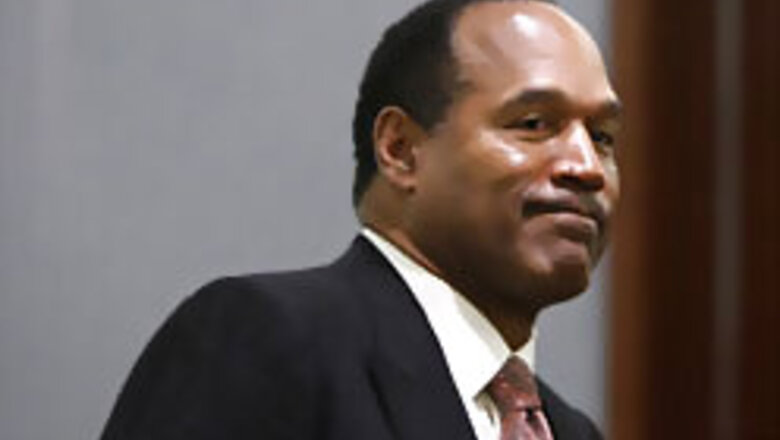
views
Las Vegas, Nevada: Former gridiron great O J Simpson was found guilty Friday of all 12 counts in the armed robbery of two sports memorabilia dealers at a Las Vegas, Nevada, casino hotel last year.
Simpson, 61, and his co-defendant Clarence "C J " Stewart, 54, were charged with a dozen offenses stemming from the alleged sports memorabilia heist. Stewart was also found guilty of the same charges as Simpson.
Simpson sat quietly and showed little emotion at the defense table as courtroom clerk Sandra Jeter read the verdicts.
After the verdicts were read, deputies immediately handcuffed Simpson and led him out of the courtroom.
Carmelita Durio, Simpson's sister, sobbed as he was being escorted out of the courtroom. As spectators left the courtroom, Durio collapsed and paramedics were called, court spokesman Michael Sommermeyer said.
Simpson and Stewart face the possibility of spending the rest of his life in prison for these convictions. Clark County District Judge Jackie Glass set sentencing for December 5.
Simpson arrived at the Clark County Justice Center at around 10:50 p.m. (1:50 a.m. Saturday ET). Simpson told CNN's Ted Rowlands on the phone before the verdict was read that he was "apprehensive."
The jury of nine men and three women, none of them African-American, reached its verdict after 13 hours of deliberations Friday. Jurors heard from 22 witnesses over 12 days of testimony. Chief among the witnesses were seven of the nine people inside Room 1203 of the Palace Station Hotel and Casino for the September 13, 2007 confrontation.
The evidence included testimony from the two dealers, four co-defendants who cut plea deals and cooperated with prosecutors and hours of often-profane, crackling, secretly recorded audiotapes.
Prosecutors alleged that the men, led by Simpson, burst into the room, flashed a gun and threatened memorabilia dealers Bruce Fromong and Al Beardsley.
The men then filled two pillowcases with Simpson trinkets, signed Pete Rose baseballs and Joe Montana lithographs. Simpson's defense attorneys maintained their client was merely trying to retrieve personal photographs and other mementos that belonged to him.
Neither Simpson nor Stewart testified during the trial. Instead, their attorneys savaged the motives of the other witnesses.
Simpson's lawyer, Yale Galanter, said Simpson was a target of investigators from the very beginning. The case "has taken on a life of its own because of Mr. Simpson's involvement," he added.
"Every cooperator, every person who had a gun, every person who had an ulterior motive, every person who signed a book deal, every person who got paid money, the police, the district attorney's office is only interested in one thing: Mr. Simpson," Galanter said.
Stewart was characterized by his lawyer, E Brent Bryson, as the trial's forgotten player.
The most compelling evidence for all sides came from the audiotapes.
For the prosecution, conversations taped by collectibles middleman Thomas Riccio took jurors from the poolside planning to the profanity-laced hotel room confrontation.
Riccio, a chatty sports memorabilia dealer and convicted felon made the rounds on network news shows immediately after the hotel room fracas. He admitted on the stand that various media outlets paid him $210,000.
The crucial evidence for the defense came from two audiotapes, a voicemail from a key prosecution witness who seemed willing to tailor his testimony for a price and tapes of Las Vegas police officers laughing and joking about Simpson's Los Angeles acquittal following his arrest.
Galanter told jurors the surreptitious recording captured police investigators in the hotel room after the confrontation. "They're making jokes. They're saying things like, 'We're gonna get him,"' he said.
Police were called to the hotel around 8 p.m. on September 13, 2007. Shortly after midnight, detectives visited Simpson at his hotel. He told them he was just trying to recover property that had been stolen from him.
"Why are they not in trouble?" Simpson asked about memorabilia dealers Beardsley and Fromong, according to police reports filed in the case. Both men testified for the prosecution, although Beardsley said Simpson did nothing wrong and was "set up" by the "rat Riccio."
Riccio, who was not charged in the case, testified that he didn't think twice about recording Simpson when asked for help retrieving what Simpson claimed was his property.
All four of the former co-defendants testified for the prosecution. Two of them tied Simpson to guns and threats.
Michael McClinton testified that Simpson instructed him to bring a gun and "look menacing" before they entered the hotel room.
Simpson has told police he had no idea the people with him were armed.
The testimony was laced with innuendo about unsavory activities by several of the witnesses, many with criminal records. Riccio and Beardsley feuded openly, calling each other names and questioning each other's sanity.
Aware that loose cannons on the stand could blow the case into mistrial purgatory, Glass refused to let David Cook testify. Cook, an attorney for the family of Ronald Lyle Goldman, searches for Simpson assets to satisfy the $33.5 million civil judgment against the former NFL star.
Simpson was acquitted of killing his ex-wife, Nicole Brown Simpson, and Goldman in a trial that ended 13 years to the day before the Las Vegas jury began its deliberations.
Regarding Glass' ruling, Cook told CNN: "If you read between the lines, I think she thought my appearance would bring up the Ghost of Christmas Past."
The case featured 19 male witnesses and just three cameo appearances from women. Swagger and testosterone ran rampant with hard stares from the witness stand.
As testimony neared its end, Glass, a former television news reporter, vented her frustration with the quibbling lawyers.
"I'm trying to get this trial back on track," she snapped. "I am surprised you haven't seen my head spin and fire come out of my mouth at this point in this trial."














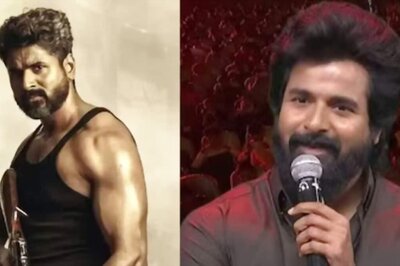
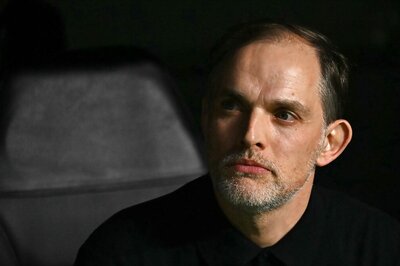

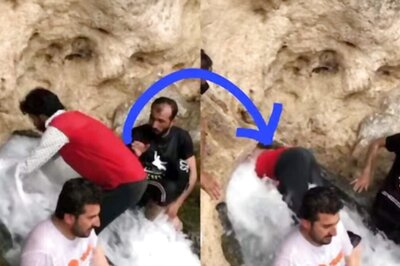
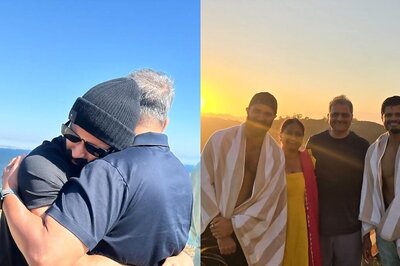

Comments
0 comment